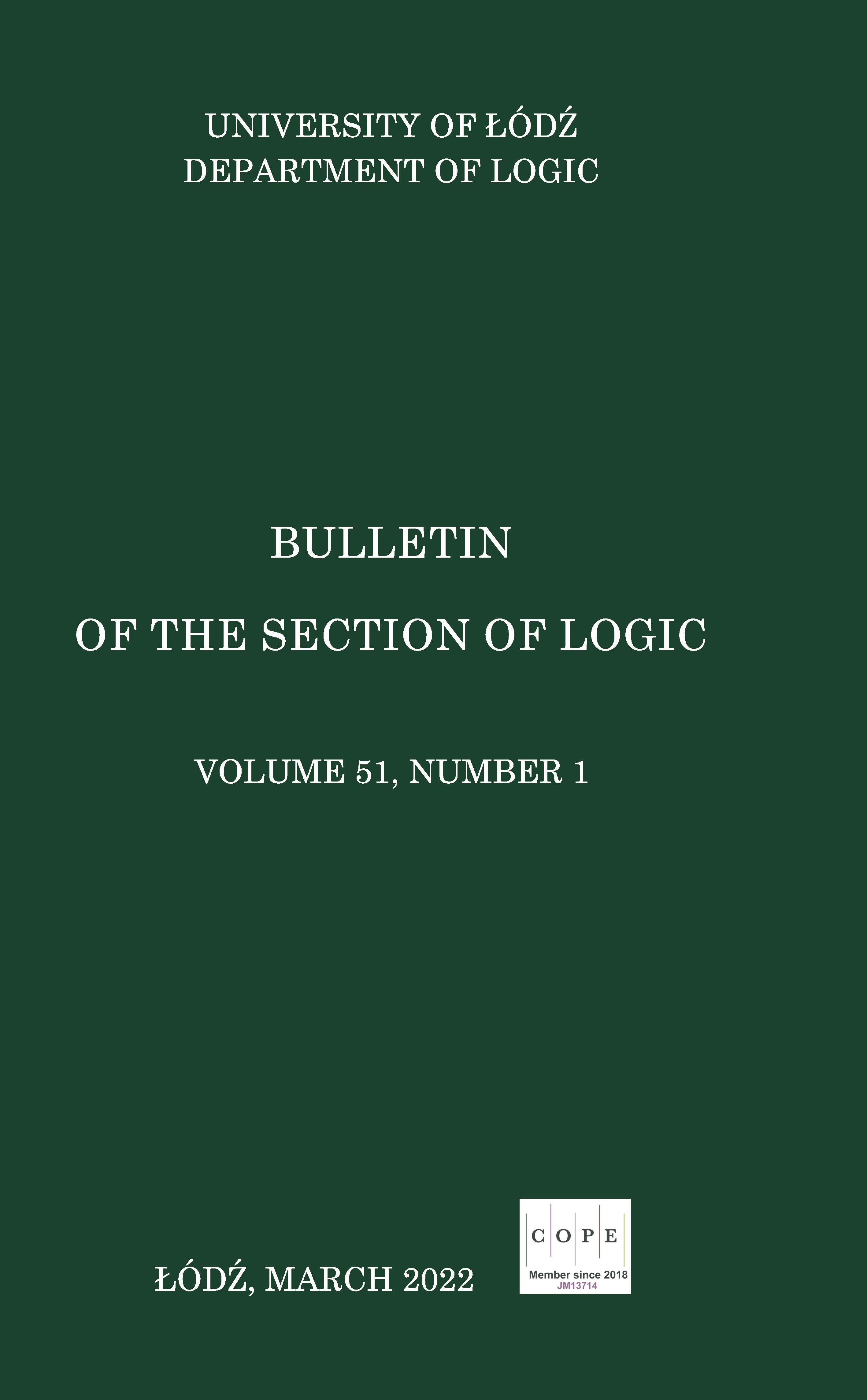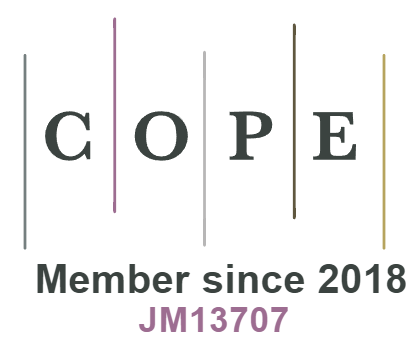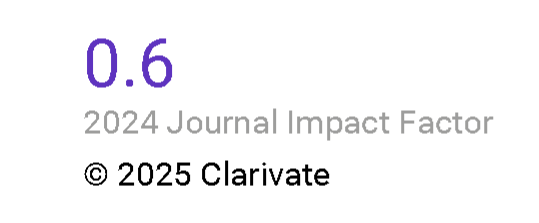An Epistemological Study of Theory Change
DOI:
https://doi.org/10.18778/0138-0680.2021.26Keywords:
Belief revision, epistemology, Parikh, relevance, Kuhn, scientific knowledgeAbstract
Belief Revision is a well-established field of research that deals with how agents rationally change their minds in the face of new information. The milestone of Belief Revision is a general and versatile formal framework introduced by Alchourrón, Gärdenfors and Makinson, known as the AGM paradigm, which has been, to this date, the dominant model within the field. A main shortcoming of the AGM paradigm, as originally proposed, is its lack of any guidelines for relevant change. To remedy this weakness, Parikh proposed a relevance-sensitive axiom, which applies on splittable theories; i.e., theories that can be divided into syntax-disjoint compartments. The aim of this article is to provide an epistemological interpretation of the dynamics (revision) of splittable theories, from the perspective of Kuhn's inuential work on the evolution of scientific knowledge, through the consideration of principal belief-change scenarios. The whole study establishes a conceptual bridge between rational belief revision and traditional philosophy of science, which sheds light on the application of formal epistemological tools on the dynamics of knowledge.
References
C. Alchourrón, P. Gärdenfors, D. Makinson, On the logic of theory change: Partial meet contraction and revision functions, Journal of Symbolic Logic, vol. 50(2) (1985), pp. 510–530, DOI: https://doi.org/10.2307/2274239
Google Scholar
DOI: https://doi.org/10.2307/2274239
F. Ansermet, P. Magistretti, Biology of Freedom: Neural Plasticity, Experience, and the Unconscious, Routledge (2007).
Google Scholar
T. Aravanis, Relevance and Knowledge Dynamics for Intelligent Agents, Ph.D. thesis, Department of Business Administration, School of Economics & Business, University of Patras, Patras, Greece (2019).
Google Scholar
T. Aravanis, On uniform belief revision, Journal of Logic and Computation, vol. 30 (2020), pp. 1357–1376, DOI: https://doi.org/10.1093/logcom/exaa058
Google Scholar
DOI: https://doi.org/10.1093/logcom/exaa058
T. Aravanis, P. Peppas, M.-A. Williams, Epistemic-entrenchment characterization of Parikh’s axiom, [in:] Proceedings of the 26th International Joint Conference on Artificial Intelligence (IJCAI 2017) (2017), pp. 772–778, DOI: https://doi.org/10.24963/ijcai.2017/107
Google Scholar
DOI: https://doi.org/10.24963/ijcai.2017/107
T. Aravanis, P. Peppas, M.-A. Williams, Full characterization of Parikh's relevance-sensitive axiom for belief revision, Journal of Artificial Intelligence Research, vol. 66 (2019), pp. 765–792, DOI: https://doi.org/10.1613/jair.1.11838
Google Scholar
DOI: https://doi.org/10.1613/jair.1.11838
T. Aravanis, P. Peppas, M.-A. Williams, An investigation of parametrized difference revision operators, Annals of Mathematics and Artificial Intelligence, vol. 89 (2019), pp. 7–28, DOI: https://doi.org/10.1007/s10472-019-09625-x
Google Scholar
DOI: https://doi.org/10.1007/s10472-019-09625-x
T. Aravanis, P. Peppas, M.-A. Williams, A study of possible-worlds semantics of relevance-sensitive belief revision, Journal of Logic and Computation, vol. 30 (2020), pp. 1125–1142, DOI: https://doi.org/10.1093/logcom/exaa029
Google Scholar
DOI: https://doi.org/10.1093/logcom/exaa029
M. Atiyah, R. Dijkgraaf, N. Hitchin, Geometry and physics, Philosophical Transactions of the Royal Society A, vol. 368 (2010), pp. 913–926, DOI: https://doi.org/10.1098/rsta.2009.0227
Google Scholar
DOI: https://doi.org/10.1098/rsta.2009.0227
W. Bechtel, R. C. Richardson, Vitalism, [in:] E. Craig (ed.), Routledge Encyclopedia of Philosophy, London: Routledge (1998), DOI: https://doi.org/10.4324/9780415249126-Q109-1
Google Scholar
DOI: https://doi.org/10.4324/9780415249126-Q109-1
G. Brewka, T. Eiter, M. Truszczyński, Answer Set Programming at a glance, Communications of the ACM, vol. 54(12) (2011), pp. 93–103, DOI: https://doi.org/10.1145/2043174.2043195
Google Scholar
DOI: https://doi.org/10.1145/2043174.2043195
M. Dalal, Investigations into theory of knowledge base revision: Preliminary report, [in:] Proceedings of the 7th National Conference of the American Association for Artificial Intelligence (AAAI 1988), The AAAI Press, Menlo Park, California (1988), pp. 475–479.
Google Scholar
E. Fermé, S. O. Hansson, Belief Change: Introduction and Overview, Springer International Publishing (2018), DOI: https://doi.org/10.1007/978-3-319-60535-7
Google Scholar
DOI: https://doi.org/10.1007/978-3-319-60535-7
P. Gärdenfors, Knowledge in Flux – Modeling the Dynamics of Epistemic States, MIT Press, Cambridge, Massachusetts (1988).
Google Scholar
P. Gärdenfors, Belief revision and relevance, [in:] PSA: Proceedings of the Biennial Meeting of the Philosophy of Science Association (1990), pp. 349–365, DOI: https://doi.org/10.2307/193079
Google Scholar
DOI: https://doi.org/10.1086/psaprocbienmeetp.1990.2.193079
P. Gärdenfors, D. Makinson, Revisions of knowledge systems using epistemic entrenchment, [in:] Proceedings of the 2nd Conference on Theoretical Aspects of Reasoning About Knowledge (TARK 1988), Morgan Kaufmann, Pacific Grove, California (1988), pp. 83–95.
Google Scholar
S. Harnad, The symbol grounding problem, Physica D: Nonlinear Phenomena, vol. 42 (1990), pp. 335–346, DOI: https://doi.org/10.1016/0167-2789(90)90087-6
Google Scholar
DOI: https://doi.org/10.1016/0167-2789(90)90087-6
H. Katsuno, A. Mendelzon, Propositional knowledge base revision and minimal change, Artificial Intelligence, vol. 52(3) (1991), pp. 263–294, DOI: https://doi.org/10.1016/0004-3702(91)90069-V
Google Scholar
DOI: https://doi.org/10.1016/0004-3702(91)90069-V
J. G. Kemeny, Mathematics without numbers, Daedalus, vol. 88(4) (1959), pp. 577–591, URL: https://www.jstor.org/stable/20026529
Google Scholar
G. Kourousias, D. Makinson, Parallel interpolation, splitting, and relevance in belief change, Journal of Symbolic Logic, vol. 72(3) (2007), pp. 994–1002, DOI: https://doi.org/10.2178/jsl/1191333851
Google Scholar
DOI: https://doi.org/10.2178/jsl/1191333851
T. S. Kuhn, The Structure of Scientific Revolutions, University of Chicago Press, Chicago (1970).
Google Scholar
E. J. Olsson, S. Enqvist (eds.), Belief Revision meets Philosophy of Science, Springer, Dordrecht (2011), DOI: https://doi.org/10.1007/978-90-481-9609-8
Google Scholar
DOI: https://doi.org/10.1007/978-90-481-9609-8
R. Parikh, Beliefs, belief revision, and splitting languages, [in:] L. S. Moss, J. Ginzburg, M. de Rijke (eds.), Logic, Language and Computation, vol. 2, CSLI Publications (1999), pp. 266–278.
Google Scholar
P. Peppas, Belief revision, [in:] F. van Harmelen, V. Lifschitz, B. Porter (eds.), Handbook of Knowledge Representation, Elsevier Science (2008), pp. 317–359, DOI: https://doi.org/10.1016/S1574-6526(07)03008-8
Google Scholar
DOI: https://doi.org/10.1016/S1574-6526(07)03008-8
P. Peppas, M.-A. Williams, Constructive modellings for theory change, Notre Dame Journal of Formal Logic, vol. 36(1) (1995), pp. 120–133, DOI: https://doi.org/10.1305/ndjfl/1040308831
Google Scholar
DOI: https://doi.org/10.1305/ndjfl/1040308831
P. Peppas, M.-A. Williams, Parametrised difference revision, [in:] Proceedings of the 16th International Conference on Principles of Knowledge Representation and Reasoning (KR 2018) (2018), pp. 277–286.
Google Scholar
P. Peppas, M.-A. Williams, S. Chopra, N. Foo, Relevance in belief revision, Artificial Intelligence, vol. 229 (2015), pp. 126–138, DOI: https://doi.org/10.1016/j.artint.2015.08.007
Google Scholar
DOI: https://doi.org/10.1016/j.artint.2015.08.007
Downloads
Published
How to Cite
Issue
Section
License

This work is licensed under a Creative Commons Attribution-NonCommercial-NoDerivatives 4.0 International License.















